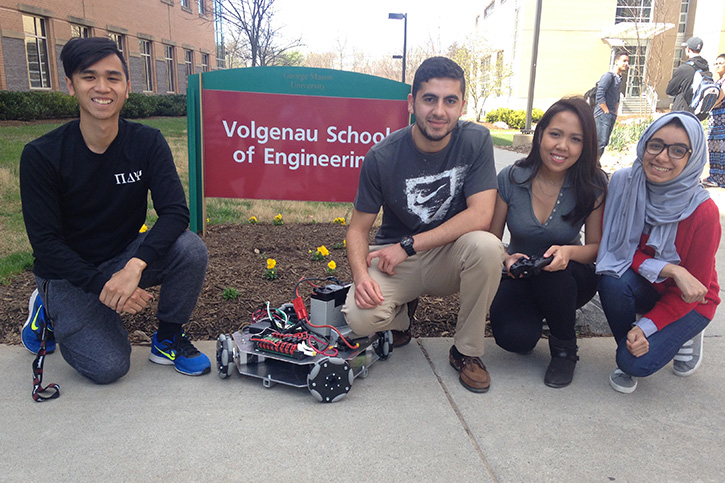
(Left to right) Engineering students Alex Wong, Karar Majeed, Pwint Htwe and Hanan Al Jarash created the robot assistant as their senior capstone design project. Photo provided.
An aging baby boomer population, and a growing shortage in the critical medical personnel needed to take care of them, pose some very serious challenges, but a group of creative George Mason University engineering students may have found a way to help.
Systems engineering majors Pwint Htwe, Alex Wong, Hanan Al Jarash and Karar Majeed devised a device that could potentially improve the lives of the mobility-impaired, while also alleviating the many demands on the nurses tasked with taking care of them. Their RAMP (Robotic Assistant for Mobility-Impaired Patients) was a senior capstone design project designed to help people retain their independence by doing everyday tasks for themselves, while also allowing registered nurses to devote as much as three additional hours daily to critical care.
“We have an aging population,” said Wong. “There’s also a nursing shortage, so you’ve got these two things coming together. The idea was to see if we could put together some technology to close that gap and provide them some assistance.”
There are currently 10 million Americans who need mobility assistance, according to the U.S. Census Bureau, fueling a rising demand for registered nurses that is expected to increase 40 percent by 2020. The number of available nurses, however, is expected to climb only 6 percent by that time, according to the Department of Health and Human Services.
The George Mason students, all of whom graduated in May, believed a robot could help bridge that gap and reduce in-home health care costs, but first they visited senior citizens at a nearby assisted living home to gauge their needs.
They discovered that mobility-impaired patients sought ways to retrieve things such as a book or reading glasses from other rooms in the house without having to rely on somebody else. They also wanted a way to simply perform visual inspections of a remote part of the house.
The Mason students experimented with a number of combinations before the robot began to take final form.
It still needs additional work, so this year’s incoming seniors will inherit the project with the hopes of finalizing it and realizing its many potential commercial applications.
This year’s group concluded its work with a demonstration at the Department of Systems Engineering and Operations Research Advisory Board’s annual meeting in April, surprising department chair Ariela Sofer when a prototype robot delivered a water bottle to her.
“There was a lot of trial and error along the way, so we learned more than we could from any textbook,” Htwe said, “but we were really satisfied with the result.”
For more information, contact Lance Sherry, the associate professor within the Volgenau School of Engineering who oversaw the project.
